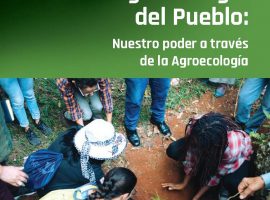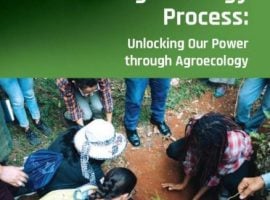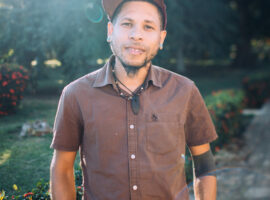Sneak peek! This is an excerpt from our upcoming publication “Through Her Eyes: The Struggle for Food Sovereignty.” This story featuring Magha Garcia, Organización Boricuá de Agricultura Ecológica and Anne Frederick,Hawai’i Alliance for Progressive Action(HAPA, is one of many that lift up the voices of women (farmers, farmworkers, food chain workers, etc.) fighting for food sovereignty around the world. Enjoy and look out for the new publication when it is released on March 1st!
Magha Garcia is an eco-farmer and environmental activist in Puerto Rico. She is a member of Organización Boricuá de Agricultura Ecológica , a grassroots group of farmers and allies who advocate for agroecology and are members of the Latin American Chapter (CLOC) of La Via Campesina. Magha also challenges agribusiness with the group Nada Santo Sobre Monsanto, a collective of multiple organizations, representatives of civil society that includes farmers, students, consumers, scientists, professional associations, teachers, and lawyers who have come together to defend the right to healthy food, free of transgenics.
Anne Frederick is the Executive Director of Hawai’i Alliance for Progressive Action which works to catalyze community empowerment and systemic change towards valuing `āina (environment) and people ahead of corporate profit. She farms on a homestead on Kaua’i. She is also the co-founder of Hester Street Collective in Lower Manhattan, New York, where she worked alongside communities on issues of urban planning and public spaces.
Magha: Due to their tropical climate, Hawaii and Puerto Rico are ideal places for the biotech seed companies like Monsanto. They can get three to four cycles of seed breeding per year. Location, shipment system and infrastructure, educated and well trained workers, and no government oversight are all factors conducive for GMO crop proliferation in the Caribbean. In Puerto Rico we have a long history of all sorts of experimentation since the U.S. invasion in 1898, but more intensively after the 1930s. Our status as a “non-incorporated territory” or colony allows the U.S. government and the corporations it supports, especially the biotechnology industry, to use us as they please. Monsanto first came to the island in 1983 when they bought the AgroSeeds Corporation. Then in 1996, Monsanto officially changed their name to Monsanto Caribe and since have grown tentacles that are woven into our communities, the public and private educational system, academia, the private sector and especially our local government. The two main functions of Monsanto Caribe are agricultural biotechnology and plant breeding experiments. The main crops they are experimenting on are corn, cotton, soy, rice, papaya, tomatoes, tobacco and sunflower. As “territories” Hawaii and Puerto Rico experience more experimentation than any of the other U.S. states.
Anne: Hawaii is particularly appealing to agribusiness because of its 12 month growing season so we have the greatest concentration of test sites, compared to the mainland. In 2014, we had 1,387 field test sites, compared to California which has around 75. Since 1987 Hawaii has hosted more cumulative genetically-engineered (GE) field trials — 3,243 — than any other state. In 2014 alone, 178 different GE field tests were conducted on over 1,381 sites in Hawaii. And the seed industry’s footprint here is 24,700 acres, so that gives you a sense of the density. The area planted in seed crops has grown tenfold since 1982 while land growing vegetables and fruits, excluding pineapples, has declined more than 50% since the late 1990s. Often those test fields are directly adjacent to residential communities and we’ve had cases where a school has had to be evacuated because all the kids got sick. The seed companies would claim it was something else. They’d say it was a weed called stinkweed here that made people sick. Multiple EPA scientists have said there’s no way it could’ve been the stinkweed.
Magha: As in most countries worldwide, the main chemical used to control weeds here is RoundUp. It is used by companies, municipalities, landscapers and homeowners to “resolve” the constant growing of weeds. Since Monsanto stated that it is “safe” for people, it is used freely and without any concern by most people. Despite an overwhelming amount of contrary evidence, their false propaganda is still working well. In our case, those experiments are in open fields and our government fully supports them, facilitating privileges like free water and tax breaks, while small scale farmers can barely survive. In the last 10 fiscal years the biotech industry received $519.7 million taxpayer dollars from our government. In addition, they received unique tax rates, exemptions, incentives and wage subsidies.
Anne: Hawaii currently imports, anywhere from 80 to 90% of its food, and we’re particularly vulnerable on Kaua‛i because we have one port where all the food comes in and if that port were to shut down, as it has in the past due to a hurricane or a dock worker strike, that’s it. We have a limited amount of food on the shelves. Food security is a real issue here and we have huge swaths of agricultural land that’s been used to test chemicals rather than grow food. There is a major need for increasing our food sovereignty here. There are people who are interested in farming but the industry and the landowners have such a hold on our local government that it’s been really hard for anyone to make headway over on the west side of the island.
Magha: In the last four years, the main initiative to confront and expose Monsanto or related companies in Puerto Rico is publicly expressed by the annual “Millions Against Monsanto” march. The collective Nada Santo Sobre Monsanto (NSSM), as an umbrella organization, is inviting the public to collaborate on improving effective strategies against Monsanto & Co. This year their efforts led to the rescuing of public land to create gardens. They also showed documentaries to address related topics like transgenic crops, health risks, agroecology, and food sovereignty amongst others.
Anne: The issue area where HAPA has been most active to date is in fair and sustainable food systems — in particular, advocating for better protections for the people and the environment here on Kaua‛i from the impacts of pesticide use. We do organizing, advocacy and education work — trying to educate the community about decision making processes, about opportunities to weigh in to effectively advocate. We sent a delegation of communities – spokespeople — to Switzerland to meet with and speak to the Syngenta shareholders. Gary, our board president, got the organization we work with over there to buy one share of Syngenta stocks so they could get Gary into a shareholders’ meeting. He delivered a very powerful message to the shareholders there about what’s happening and what they’re supporting in Hawaii and specifically on Kaua‛i. We brought over another board member who is a Hawaiian mother living in the homesteads directly adjacent to where Syngenta sprays, whose daughter’s hair has tested positive for 36 different pesticides, including 9 restricted-use pesticides.
We’ve been doing a lot to try to advocate for the governor to mandate and fund data collection and coordination of government agencies on the impact of pesticides. We brought a group of mothers from impacted communities to the governor’s office to meet with him and make a case for implementing the findings in his own report. We continue to provide public education about what’s going on right now with the court cases. We had hearings at the 9th Circuit Court of Appeals here in Hawaii. We were able to raise awareness about that and livestream it, continuing to work with our partners to identify other areas where we think we can have some wins. So one of our campaigns is to try and ban chlorpyrifos, which is one of the chemicals the EPA has already said it’s going to ban and is heavily used here.
Magha: There’s still a lot to do but there is an increasing number of people who are helping spread the message. Organizations like Boricuá, CLOC, Via Campesina are in a continual educational process, spreading the message. On a personal level, I believe that it is best for people to grow as much of their own food as possible in order to boycott and avoid the GMO industry.
Anne: We are continuing to organize and develop our community leaders who are on the frontlines of impacted communities and find opportunities for them to develop their leadership. That led us to develop another area of our work which we call ‘reclaiming democracy’ because what we found is that the industry has such a hold on our local government and elected officials, that it’s almost impossible to pass any legislation regulating the industry at all. There’s a tremendous need to get fresh blood into our local government and to encourage people who are not part of the status quo to step up and run for local government. So we started a candidate’s training program that includes leadership development, campaigning skills, some community organizing skills. So again trying from another angle — how do we encourage people that want to make a difference in their local community to step up and enter local government and try to run for office? It is a nonpartisan program and we can’t endorse any of the candidates but we can at least provide skills and training.
Magha: Puerto Rico needs allies outside of our island to help us denounce the atrocities, abuses and severe risks of the agro-biotechnology industry. Puerto Rico is in the middle of a complex financial crisis. The current debt is $73 billion. The U.S. Congress and the U.S. Justice Department decided that we have to pay a debt that was created by our government. Since we are a non-incorporated territory we cannot claim bankruptcy. In order to find a solution to this “crisis,” they imposed a Fiscal Board that will govern our country. This board has absolute control over the finances and many other financial and business issues. Their main purpose is to make sure that the investors will get their money back by all means possible. Meanwhile the only ones investing in Puerto Rico are the biotechnology corporations. Last week, Bayer of Puerto Rico announced that they are investing $17 million to remodel their main branch and create a new one. Monsanto is also consolidating and investing more in their facilities located in the South of the island. We have no doubt that the 11 biotechnology corporations will be fully protected by this board.
Anne: The most heavily impacted communities happen to have the highest density of Native Hawaiian residents. I think they have been some of the most powerful voices, especially Native Hawaiian mothers like Malia Chun on Kaua‛i who’s been a really vocal critic of the industry and a very powerful voice. A lot of companies claim to be these major job providers but actually it’s a pretty small amount. You talk to plenty of Hawaiians over there and they all just say that [the jobs that are created] are not worth the contamination of our land; we have to look more long-term at the future of āina. The seed company has been really successful in using this issue to drive a wedge in our community and there’s this ‘don’t rock the boat’ mentality — “don’t threaten your jobs, don’t make waves.” That’s why voices like Malia and other mothers who are Native Hawaiian are so important in the movement. And stepping up in our small communities is really challenging. I think here is where relationships are so important. People don’t like to jeopardize relationships or talk out against their neighbor, so people are very reluctant to speak out about the industry publicly. The ones who do put themselves out there become exhausted and it takes a toll. Also, there have been cases where people have stepped forward and shared their stories and were not happy with the media’s use of their story.
On the north shore of Kaua‛i, we have a lot of organic farms and generative farming practices and then the west side is literally like a food desert. So there are folks on the west side — like one of our board members, Josh Mori, and some of his partners who are trying to start a youth farming initiative. Similarly there’s an organization on Oahu called Ma‛o Farms which has a similar mission of youth leadership development, growing the next generation of farmers, and trying to create pathways in local agriculture. There’s definitely work happening; it’s just hard because those projects tend to be relatively small and we don’t have the political will to incentivize them or to get them on state land. So even though there’s discussion at our county and state level of increasing food production, it seems like the policy has to catch up to our goals of increasing food production. Meanwhile, there are a lot of people just kind of doing it — just trying to create the solutions outside of working with government. I think we could be doing a lot more to incentivize that here. For instance, last year we hosted a food justice summit, with the help of the Pesticide Action Network, where we brought together four women working on food sovereignty projects and battling the impacts of the agrichemical industry in their home countries to speak about their struggles and lessons learned and to share and exchange with Hawaiians and with the local food movement here. That was really powerful. I think that it’s helpful to share what’s happening in Hawaii because people think of Hawaii as this tropical paradise where you come for your honeymoon. Yet we are ground zero for pesticide testing. Pesticides are actually going into the water here, this pristine beauty that we think is Hawaii is actually not the case; our ecosystems are in distress and sharing that message is really important.






